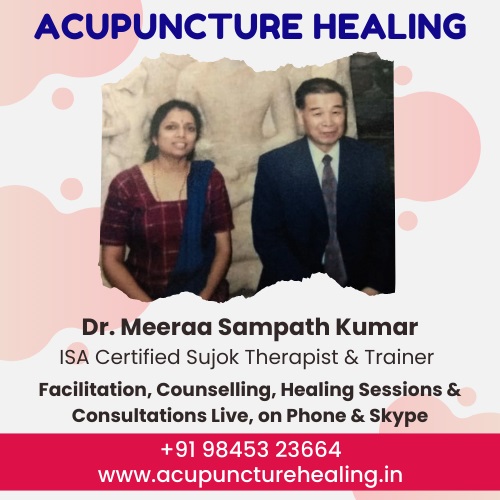Alternative Therapies
- Alternative Medicine
- Access Bars
- Acupressure
- Acupuncture
- Angel Healing
- Ayurveda
- Bach Flower Remedies
- Breathwork
- Cosmetic Acupuncture
- Crystal Healing
- Cupping Therapy
- Emotional Freedom Technique (EFT)
- Ergonomics
- Face Reading
- Fengshui
- Geopathic Stress
- Graphology
- Heal Your Life
- Holistic Solutions
- Holy Fire Reiki
- Homeopathy
- Hypnotherapy
- Jesus Reiki
- Jikiden Reiki
- Lama Fera
- Law of Attraction
- Manual Therapy
- Meditation
- Motivational Counseling
- Mudra Healing
- Nakshatra Energies
- Naturopathy
- Neuro Linguistic Programming (NLP)
- Panchakarma (Ayurveda)
- Panchkarma Holistic Healing - Mind Control
- Past Life Regression
- Physiotherapy
- Pranic Healing
- Pyramids
- Reiki
- Rudraksh
- Silva Mind Control Method
- Sujok therapy
- Switchwords
- Symphony of Possibilities
- Tarot
- Unani Medicine
- Yoga
Diseases & Conditions
- Acne & Pimples
- Allergies
- Arthritis
- Asthma
- Behavioural Disorders
- Dandruff
- Diabetes
- Emotional Problems
- Gallstones
- Gastritis
- Hairloss
- Heart Diseases
- Hormonal Problems
- Hypertension
- Immune Disorders
- Infections
- Infertility
- Jaundice
- Kidney Disorders
- Liver Disorders
- Menstrual Disorders
- Migraine
- Neck & Back Pain
- Obesity
- Osteoporosis
- Peptic Ulcer
- Prevention
- Prostate Problems
- Psoriasis
- Sexual Dysfunctions
- Sinusitis
- Sleep Disorders
- Skin Diseases
- Stress
- Thyroid Disorders
- Ulcerative Colitis
- Urinary Infections
General Wellness
Osteoporosis Treatment In Jayanagar
Dr. Annapoorna Bhat

Dr. Annapoorna is an authorised ayurvedic consultant for ISRO - INDIAN SPACE RESEARCH ORGANISATION, Jayanagar since 15 years AND IISc - INDIAN INSTITUTE OF SCIENCE - Jayanagar since 10years. She is also a visiting professor at SRIRAGHAVANDRA AYURVEDA MEDICAL COLLEGE, CHITRADURGA.

Acupuncture Healing - Dr. Meeraa Sampath Kumar

Dr. Meeraa Sampath Kumar is a certified holistic health practitioner and a pioneer in the field of Sujok Acupuncture in Karnataka. Highly trained and experienced, she constantly updates her training skills and knowledge in the field of Sujok Therapy and Onnuri medicine....

Osteoporosis

Osteoporosis causes
Osteoporosis is a condition that causes weakening of the bones in your body. Also called "brittle bone disease," osteoporosis increases your chance of sustaining a broken bone. Broken bones can cause significant problems, especially when a spine fracture or broken hip occurs. Because of these concerns, all people should understand their chance of developing osteoporosis, and if they need steps to prevent the development or progression of osteoporosis.
What is Osteoporosis?
Osteoporosis is a condition that weakens the bones of your skeleton. Bones, like other tissues in your body, are living structures that constantly are changing. New bone is made and old bone is taken away. Osteoporosis develops when the pace of new bone formation cannot keep up with the loss of bone.
How is Osteoporosis Diagnosed?
Everyone should know their risks for developing osteoporosis, and anyone who is "at risk" for osteoporosis should have their bone density checked. A bone density test can be performed for patients who may have osteoporosis. Bone density tests are also useful to monitor the progression of osteoporosis and the response to treatments.
When Should I Be Tested?
Some people should be tested for osteoporosis at an earlier age. Knowing the signs to look for can help you understand when the time is right to have a bone density test. If you are ever unsure, you should discuss this with your doctor. It is also a good idea to ask your doctor about a bone density test. Your doctor may be focused on management of your blood pressure, cholesterol, or other medical conditions. It is helpful if you ask about when to have a bone density test.
Warning Signs & Symptoms
Osteoporosis is a condition that causes thin and weak bone. Preventing the progression of osteoporosis can help reduce the risk of fracturing the bone. Know the warning signs that you may have osteoporosis, so you can get help preventing the progression of this condition.
Osteoporosis Drugs
Medications are often used as part of the treatment for patients with osteoporosis, as well as those who have a significant chance of developing osteoporosis. Most osteoporosis medications try to prevent our natural process of bone loss. A new type of medication is also being used in some situations to stimulate bone formation.
Osteoporosis & Fractures
Broken bones are the often the end result of osteoporosis. The goal of treatment is to prevent sustaining a broken bone, especially a broken hip. Some of the more commonly fractured bones in the body as a result of osteoporosis include:
* Spine Compression Fractures
* Shoulder Fractures
* Pelvis Fractures
* Hip Fractures
* Tibial Plateau Fractures
* Ankle Fractures
* Any broken bone can be the result of osteoporosis. These are the more common injuries seen with this condition.
Prevention of Fractures
The problem with osteoporosis is that this condition increases your chance of sustaining a fracture. Fortunately, there are steps you can take to prevent these injuries. Most osteoporosis related fractures occur as the result of simple injuries and falls around the house. Taking steps to improve your bone health helps to prevent fractures. Other steps you can take include checking medications for side-effects that can lead to falls, and having your vision regularly evaluated.




